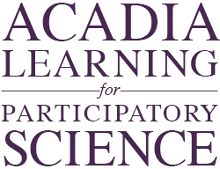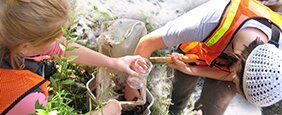|
Literacy.RI.11-12.7
|
Integrate and evaluate multiple sources of information presented in different media or formats (e.g., visually, quantitatively) as well as in words in order to address a question or solve a problem. |
|
Literacy.RI.6.4
|
Determine the meaning of words and phrases as they are used in a text, including figurative, connotative, and technical meanings. |
|
Literacy.RI.6.8
|
Trace and evaluate the argument and specific claims in a text, distinguishing claims that are supported by reasons and evidence from claims that are not. |
|
Literacy.RI.7.4
|
Determine the meaning of words and phrases as they are used in a text, including figurative, connotative, and technical meanings; analyze the impact of a specific word choice on meaning and tone. |
|
Literacy.RI.7.8
|
Trace and evaluate the argument and specific claims in a text, assessing whether the reasoning is sound and the evidence is relevant and sufficient to support the claims. |
|
Literacy.RI.8.4
|
Determine the meaning of words and phrases as they are used in a text, including figurative, connotative, and technical meanings; analyze the impact of specific word choices on meaning and tone, including analogies or allusions to other texts. |
|
Literacy.RI.8.8
|
Delineate and evaluate the argument and specific claims in a text, assessing whether the reasoning is sound and the evidence is relevant and sufficient; recognize when irrelevant evidence is introduced. |
|
Literacy.RI.9-10.8
|
Delineate and evaluate the argument and specific claims in a text, assessing whether the reasoning is valid and the evidence is relevant and sufficient; identify false statements and fallacious reasoning. |
|
Literacy.RST.11-12.8
|
Evaluate the hypotheses, data, analysis, and conclusions in a science or technical text, verifying the data when possible and corroborating or challenging conclusions with other sources of information. |
|
Literacy.RST.6-8.4
|
Determine the meaning of symbols, key terms, and other domain-specific words and phrases as they are used in a specific scientific or technical context relevant to grades 6-8 texts and topics. |
|
Literacy.RST.6-8.7
|
Integrate quantitative or technical information expressed in words in a text with a version of that information expressed visually (e.g., in a flowchart, diagram, model, graph, or table). |
|
Literacy.RST.9-10.4
|
Determine the meaning of symbols, key terms, and other domain-specific words and phrases as they are used in a specific scientific or technical context relevant to grades 9-10 texts and topics. |
|
Literacy.RST.9-10.7
|
Translate quantitative or technical information expressed in words in a text into visual form (e.g., a table or chart) and translate information expressed visually or mathematically (e.g., in an equation) into words. |
|
Literacy.RST.9-10.8
|
Assess the extent to which the reasoning and evidence in a text support the author's claim or a recommendation for solving a scientific or technical problem. |
|
Literacy.W.11-12.1
|
Write arguments to support claims in an analysis of substantive topics or texts, using valid reasoning and relevant and sufficient evidence. |
|
Literacy.W.11-12.2
|
Write informative/explanatory texts to examine and convey complex ideas, concepts, and information clearly and accurately through the effective selection, organization, and analysis of content. |
|
Literacy.W.11-12.4
|
Produce clear and coherent writing in which the development, organization, and style are appropriate to task, purpose, and audience. |
|
Literacy.W.6.1
|
Write arguments to support claims with clear reasons and relevant evidence. |
|
Literacy.W.6.2
|
Write informative/explanatory texts to examine a topic and convey ideas, concepts, and information through the selection, organization, and analysis of relevant content. |
|
Literacy.W.6.4
|
Produce clear and coherent writing in which the development, organization, and style are appropriate to task, purpose, and audience. |
|
Literacy.W.6.9
|
Draw evidence from literary or informational texts to support analysis, reflection, and research. |
|
Literacy.W.7.1
|
Write arguments to support claims with clear reasons and relevant evidence. |
|
Literacy.W.7.2
|
Write informative/explanatory texts to examine a topic and convey ideas, concepts, and information through the selection, organization, and analysis of relevant content. |
|
Literacy.W.7.4
|
Produce clear and coherent writing in which the development, organization, and style are appropriate to task, purpose, and audience. |
|
Literacy.W.7.9
|
Draw evidence from literary or informational texts to support analysis, reflection, and research. |
|
Literacy.W.8.1
|
Write arguments to support claims with clear reasons and relevant evidence. |
|
Literacy.W.8.2
|
Write informative/explanatory texts to examine a topic and convey ideas, concepts, and information through the selection, organization, and analysis of relevant content. |
|
Literacy.W.8.4
|
Produce clear and coherent writing in which the development, organization, and style are appropriate to task, purpose, and audience. |
|
Literacy.W.8.9
|
Draw evidence from literary or informational texts to support analysis, reflection, and research. |
|
Literacy.W.9-10.1
|
Write arguments to support claims in an analysis of substantive topics or texts, using valid reasoning and relevant and sufficient evidence. |
|
Literacy.W.9-10.2
|
Write informative/explanatory texts to examine and convey complex ideas, concepts, and information clearly and accurately through the effective selection, organization, and analysis of content. |
|
Literacy.W.9-10.4
|
Produce clear and coherent writing in which the development, organization, and style are appropriate to task, purpose, and audience. |
|
Literacy.W.9-10.9
|
Draw evidence from literary or informational texts to support analysis, reflection, and research. |

 Acadia Learning brings scientists, teachers, and students together in partnerships that result in useful research and effective science education.
Acadia Learning brings scientists, teachers, and students together in partnerships that result in useful research and effective science education.